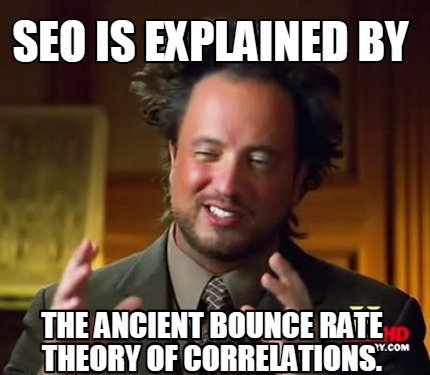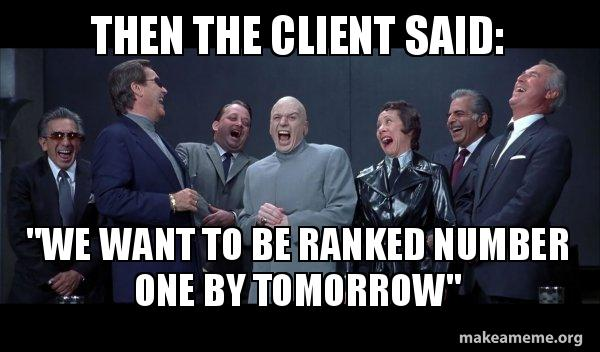You’ve heard about the wonders of SEO and its ability to catapult your website to the top of Google search results, opening the floodgates to traffic, leads, and ultimately more sales. However, you’re probably wondering, ‘Is SEO truly effective or is it just tech industry buzzword magic?’ You’ve come to the right place. In this article, you will find out whether SEO is actually effective, what it encompasses, and what’s not great about it.
There’s a lot of noise out there – especially when it comes to SEO.
Amidst this noise, who should you listen to for sound advice on the topic?

We’ve guided countless businesses through the labyrinth of SEO. We know what works. And, more importantly, we know what doesn’t work.
It’s only natural to wonder whether SEO is actually effective. Afterall, those who swear by it rely on business owners like you to invest in it, so of course they’ve got nothing bad to say about it.
The difference at RedPandas is that we strongly believe in insourcing your marketing. This means that, while we do sell digital marketing services such as SEO, we prefer to coach businesses to build their own in-house marketing teams so that they no longer have the need to outsource their marketing.
With this interest in mind, you’ve come to an objective source. We’ll tell you about the good and the bad when it comes to SEO, and by the end of this article, you’ll know exactly how effective SEO is and what it encompasses.
What is SEO?

Search Engine Optimisation (SEO) is the practice of improving the visibility and ranking of your website on search engines like Google.
The goal? To appear at the top of search results when individuals search for the products or services you offer.
The goal is that the more often you appear at the top of Google for search terms that are relevant to your business, the more likely you are to get clicks on your website, which ultimately translates to more leads and more sales. At the end of the day, it’s about the bottom line.
There are three primary components to SEO:
- Content creation: Crafting unbiased, helpful content that resonates with your audience and provides answers to their questions.
- On-site optimisation: Refining the technical aspects of your site such as site speed, mobile-friendliness, internal linking, and tag optimisation.
- Off-site optimisation: Boosting the authority of your site via reputable external websites, through means like backlinks and brand mentions.
Is SEO Effective?
In a world where anyone can create and share authoritative content, it’s difficult to know who and what to trust.
You might’ve read in multiple places that SEO is effective.
You might’ve read that it’s not all it’s cut out to be.
So, who are you supposed to listen to?
After working with businesses for over a decade on SEO, we’ve come to the conclusion that SEO can be effective. However, it’s more complicated than that.
Ultimately, whether SEO works for your business depends on whether:
- You have the resources to effectively implement SEO
- You can source the expertise required to implement SEO
- Your team is producing content in house that answers buyer questions (we recommend three blog articles per week)
- You have visibility over your marketing and sales activities in your business
First, you’ll want to consider whether the benefits that SEO provides are relevant to your business.
Benefits of SEO
- Long-term strategy: SEO generates traffic, leads, and sales over time. Once set in motion, its positive effects can last for a long duration. In other words, once you get it right, the proverbial floodgates have opened
- Authority and reputation: In order to improve your SEO, you need to focus on creating high-quality, informative, and engaging content. This ultimately helps you become a trusted advisor in your industry and positions you as an authority in your space, which only helps you close more deals
- Trust-building: Let me ask you a question: do you find the website that appears first on Google search results more trustworthy than the one that appears on the tenth page? Most of the time, the answer to this is yes. By appearing at the top of search engine results pages, you can increase your trust with your target audience, making it more likely that they’ll choose your business over competitors
- Cost-effectiveness: Despite an initial investment, SEO proves cost-effective in the long run due to sustained results without the recurring costs of advertising, such as PPC advertising.
How long does it take to work?
It’s crucial to keep in mind that SEO is a marathon, not a sprint.

The competitiveness of your industry will ultimately determine the speed at which you see results. In a less competitive industry, you may see results instantly.
However, in a more competitive industry, it takes time and consistent effort, often taking months or in some cases even years to achieve desirable rankings.
But once the results start to show, they tend to be sustainable and worthwhile if you stay on top of your game.
Here’s an example of significant traffic growth after a five month period from utilising SEO. Keep in mind that everyone’s results will be different.

Downsides of SEO
It’s important to also consider the downsides of SEO. It’s easy to pretend it’s all airy-fairy and great, but the reality is, there are some downsides to consider which may impact your decision to invest in SEO.
Some of the downsides include:
- Time consuming
- Takes time to get results
- Can be competitive
- Unpredictable search engine algorithms
Time consuming
SEO isn’t a one time do it and leave it game. It’s an ongoing haul.
You need to consistently produce content, optimise your website, and conduct keyword research. On top of that, you need to stay on top of new updates that emerge from Google.
Ultimately, it takes time, and this is ongoing, which means you need to consider ongoing resources to maintain this.
And if you’re not getting results quickly enough, this can be really disheartening for your team, and for you…which leads me to the next point…
Takes time to get results in competitive industries
If you’re doing SEO and you’re in a competitive industry, you’re in it for the long haul *sigh*.
Depending on your industry and competition, it may take months or even years to achieve better rankings in search results.
This can be frustrating for the non-marketers in your team, especially if you need to get results fast. On top of this, you’ll need to stay on top of your game to avoid competition from getting ahead.
Can be competitive
Certain keywords can be highly competitive, making it difficult to achieve top rankings.
For example, the keyword ‘SEO marketing agency sydney’ the competition is quite high and it may be difficult to rank for this keyword. We can see this in the below image, which shows that the competition is ranked at a 0.69 out of 1 (1 being most competitive) and the Keyword Difficulty percentage (KD%) being 50%, which is right in the middle.

On the other hand, the keyword ‘ecommerce SEO agency’ has a KD% of 19 and a competition level of 0.16, meaning that it is much easier to rank for.

One thing you’ll want to consider before investing in SEO is how competitive your keywords are.
The more competitive they are, the harder it will be to rank for them. If this is the case, perhaps SEO won’t be as immediately effective as something else, like PPC for example.
Unpredictable search engine algorithms
Imagine investing in SEO for years, improving your rankings, and increasing your bottom line. And then, Google announces an update about an algorithm change.
And bam. Just like that, your SEO rankings have dropped and your website requires work to get back on top.
A good example of this was in 2011 when Google introduce the Google Panda Update. Many websites were producing low quality content but ranking highly, so Google introduced an update that penalised websites if they had low quality content, regardless of the quantity of content on their website. This resulted in many websites seeing their traffic vanish overnight.
As Google introduces new updates, they will inevitably impact your website’s search traffic. As such, it’s important to stay on top of these trends so you can minimise their impact.
Fortunately, you can minimise their impact by focusing on creating high-quality content and adhering to SEO best practices.
How to Implement SEO?
Implementing SEO involves two key parts:
- Writing helpful content
- On site and off site optimisation tactics
Let’s review both.
Writing helpful content

Google’s Helpful Content Update in 2023 made one thing clear: content is king. Google prioritises content that it deems to be helpful to users over all other SEO measures.
So, the number one way to improve your SEO is to focus on creating ‘helpful’ content. But what does this even mean?
Helpful content isn’t just content that sounds good or looks pretty—it solves a problem, answers a question, or meets a need for your prospective customers. It’s the content that your audience finds valuable enough to read, share, and act upon.
One of the key aspects of helpful content is answering buyer questions. This requires an understanding of what your potential customers are asking or searching for. Engaging with your sales team can provide invaluable insights in this regard. Sales teams interact with prospects daily, hearing their concerns, answering their queries, and understanding their needs.
Once you have a list of frequently asked questions from your sales team, these can form the basis of blog articles. Answering these questions through your content not only adds value to your audience but also boosts your visibility on search engines. Google loves content that answers users’ questions.
Another way to make your content more helpful and SEO-friendly is by leveraging keyword research tools like SEM Rush. This tool helps you identify high-volume keywords with low competition in your niche. These are search terms that many people are looking for but not many websites are addressing adequately and transparency. It might also be useful to write blog articles around keywords that have low search volume and low competition.
Writing blog articles with keywords baked in means you’re providing content that a number of people are actively searching for, hence improving your chances of ranking higher in search results.
But remember, the keyword is just a starting point.
Your content should always focus on delivering valuable information that goes beyond just addressing the keyword.
In short, creating helpful content is all about understanding your audience’s needs, answering their questions, and providing value. It’s a mix of insight, relevance, and usefulness. When these elements come together in your content strategy, you’re well on your way to improving your SEO performance.
On site and off site optimisation tactics
While content is a vital component of SEO, there are numerous other factors to consider that can help you improve SEO.
These fall into two categories: on site optimisation and off site optimisation.
| On-Site Optimisation | Off-Site Optimisation |
| Keyword Optimisation | Backlinking |
| Metadata Optimisation | Guest Blogging |
| URL Structure | Influencer Outreach |
| Internal Linking | Forum Participation |
| Mobile-Friendly Design | Directory Submissions |
| Fast Page Load Speed | Press Releases |
| XML Sitemap | Brand Mentions |
| Structured Data Markup | User Reviews |
| Quality Content Creation | Local SEO Citations |
| User Experience (UX) |
Each item in the rows above is something that you can implement to help give you the edge with your SEO. For more information on how to implement these, see our article on 20 tips to improve your SEO.
So then, is SEO really effective or is it just another tech industry buzzword?
The journey of SEO is not a straightforward sprint. Instead, it is a long, hard marathon… but a rewarding one all the same.
Ultimately, SEO’s effectiveness is indisputable. While challenges do exist (like competition and algorithm changes) they can be navigated by focusing on quality and helpful content production.
If you can dedicate the resources to boost your SEO and if you’re not in a rush to produce results, then it makes sense to invest in it, because the results are worth it.
On the other hand, if you don’t have resources that can be provided on an ongoing basis, or if you need results fast for whatever reason, then SEO may not be your best option right now.
More than SEO, what you really need to be focusing on is producing helpful content. The more helpful content you produce, the better off your SEO will be. And on top of that, producing helpful content actually helps your sales team close more deals.
Want to know how to produce helpful content? Check out the article we wrote here on producing articles that rank and generate leads.














